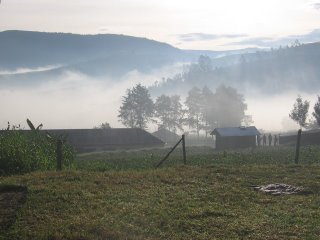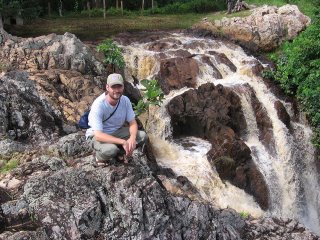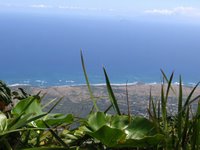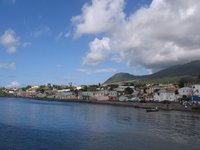This post ended up being a little long (you know how wordy I get), so you can skim through it.
So I’m heading for two years of service in Uganda with the Peace Corps. Before that, I go to staging in Boston where I’ll meet up with the others in my training group, get vaccinations, attend workshops or whatever else is planned, and attend the 45th anniversary of the Peace Corps event. Staging is March 2-5 (It was going to be March 8-10, but they bumped it up). Then we go to Uganda and begin our Pre Service Training (PST), which will consist of language, cross-cultural communication, area studies, development issues, health and personal safety, and technical skills pertinent to our specific assignments. After about 10 weeks of training, I will be sworn in a full-fledged Peace Corps Volunteer (PCV).
It seems like it’s been a long time since November 15, 2004 when I submitted my application to the Peace Corps. There’s a lot of steps and paperwork involved in the application process. It’s finally getting close, though.
I’ll try to address some of the questions that I’ve received, but feel free to ask more questions by emailing me or posting them in comments.
I don’t know the details of what I will be doing, but it will be something to do with community health, water, and sanitation. All volunteers in Uganda incorporate HIV/AIDS education and prevention into their programs. During training, the staff will get to know us and our skills and interests and will match us up with community organizations around the southwestern part of the country that we will work with at our posts. Once at post, we will work with the community organization and our counterpart in the organization to determine programs and projects to work on that meet the needs of the community. Volunteers typically are assigned individually and don’t work daily with other volunteers. The goal is to develop projects that are self sustaining after we leave, so there isn’t a dependence on outsiders. During training, we will stay with a homestay family, then most likely at post we will have our own places, although volunteers sometimes stay with a family or on a compound of an organization or school. Wherever they live, the community typically becomes their extended family, looking out for them and including them in community activities.
The Peace Corps provides transportation to to Uganda, and back at the end of service, medical care for volunteers, issues training materials and equipment, provides stipends for food, clothing, housing, some traveling, etc. Basically, all our living expenses should be covered with enough money to live in a similar lifestyle as those we are living with. In reality, we probably get a little more than that, and we for sure have benefits others in our communities won’t have. I don’t know what kind of accommodations I will have, or whether or not I will have electricity or running water. Some volunteers in Uganda do, some don’t. Like everything, it depends. For a good perspective on PCV living conditions, I encourage you to read this post on thirdgoal.com by a PCV.
When I started thinking through the whole overseas service thing, I wanted to know details like anyone would want to know in order to make an informed decision. I wanted to know what my job responsibilities would be, want kind of living arrangements I would have, how I would get my food, where I would do laundry, how I would get my haircut, etc., but when there were no answers I came to the realization that I would just figure everything out as I needed to. I think this is good for any place in life: to prepare as much as possible, but not sweat the details because I have confidence I’ll figure things out as needed. I also had thought that I should have a plan for what I was going to do after the two years, since that’s not really a career, but I have no idea what I will do. I decided that if I waited until I had it all planned out, I would never do anything.
After the close of service, volunteers receive a readjustment allowance to use for getting going again in the U.S. Standard length of service is two years after we are sworn in at the end of training, although there is the possibility of extending for a year if you have needed skills and the programs you are working with warrant it. We build up two leave days per month of service to use for traveling, coming back home, etc. I don’t know if I’ll come back home during my service or not. If there is a significant family event I would, otherwise we’ll just see how the tides flow. I do want to do some traveling in the area either during my service or after.
The Peace Corps is a government organization, so my service is paid for by the taxes of good people like you. It also sometimes has the bureaucracy of the government. In country, there is a Country Director who oversees the programs and volunteers, and Associate Country Directors who oversee the programs. The Peace Corps also employs some other staff, and training is done by staff, Ugandans, and PCV who have been around the block.
I’ve been asked if it is safe in Uganda, or if it is politically stable. In a word, yes and yes. Some people remember Idi Amin who was a dictator in the 70’s with a bad human rights record, to put it rather mildly. Milton Obote also wasn’t so good for the lives of the people. Yoweri Museveni is currently the president, and has been in power since ’86. He is an elected president, and has done much to turn the country around. The country has improved economically, and Uganda is one of the few African countries who has made good progress in the fight against HIV/AIDS. However, there has been increasing concern about him in recent years. The first multi-party elections will be held now at the end of February. Up to now there was a no party system. The man who is the main contender against Museveni was arrested on re-entering the country last November on charges of treason and rape. There’s some speculation as whether or not this was politically motivated. I’m no political analyst, and I’m not going to Uganda to be involved in politics, so I’m not going to get into too much here, but it will be interesting to see how this election plays out and the impact on the direction of the country. For a political history of Uganda, here are some links: Wikipedia, Enter Uganda
If you observe the news articles about Uganda or the bordering countries of Sudan or DRC (Democratic Republic of the Congo, or just Congo; used to be Zaire) on the internet (I have links on the right to get you started) you will probably see mention from time to time of a rebel group called the Lord’s Resistance Army (LRA). This is a group with a rather bad human rights record, again to put it mildly, which has been a problem in Northern Uganda for the last twenty years. They also cross into Southern Sudan, and Eastern Congo. If you desire, you can easily find more information on the internet. Interestingly the University of Kansas has a student group involved in aiding those affected by the LRA in Northern Uganda. The human rights crisis caused by the LRA, and the “African World War” in Eastern Congo involving nine African nations including Uganda (which ended in 2003) have largely been ignored by the West. But then nobody cared much about the genocide in Rwanda in ’94, either.
I bring up that stuff to say that you might see mention of it in the news, but that it is completely safe for PCV in Uganda. The small rebel group is far from where any PCV are located and the areas where the PC works are unaffected. The PC’s first priority is the safety of its volunteers and it makes sure it doesn’t get a bad name or put any Americans at risk. Case in point is that prior to Dad’s last trip to Haiti, the PC pulled all of the volunteers and staff out of Haiti for safety, and Dad went ahead and went down there and had no problems. The long term people Dad worked with there have stayed, and the PC has yet to re-enter the country. I have no concerns for safety, other than the normal considerations for traveling, with pickpockets and whatnot, and the other future trainees in my group and current PCV in country that I have talked to are not worried about safety. In fact, I suspect I will be at least as safe there as here in Kansas City.
So why do I want to join the Peace Corps? Well, that’s a good question. As is the case with most everything in life, there are multiple factors coming together that lead to this path I have before me. Basically my plan is to change the world into the way I want it, then kick back and enjoy living in a perfect world. Okay, not really. I actually don’t really plan to change the world. If I wanted to do that, I would be very disappointed. I only have a small sphere of influence, and change may seem painstakingly slow, only with great effort, and end up being very small. I have no notions of a romanticized adventure, heroically sweeping in and solving all of Africa’s problems with my superior American wisdom. I don’t even know if I have anything that the people of Uganda really need. What do I know about the problems facing a small community in southwest Uganda? I’m going to try my best to improve life for a few people, though. The whole business of foreign aid and development is a very tricky one, and I’m just starting to learn about it. It’s easy to have good intentions, but to actually do good seems to be the thing. If the solutions to the problems were easy, they’d be done already. The PC has three goals (I’m paraphrasing): 1) provide educated individuals to countries who would have them to transfer knowledge and aid in development, 2) to increase the cultural understanding of Americans by people in other countries, and 3) to increase the cultural understanding of other people by Americans. I think these are good goals. We as Americans don’t always have an accurate perspective of what the world is like in the eyes of other people, and it is important in this day and age for other people to have an understanding of Americans more than just the rich big brother government or what they see on TV or radio. I hope, also, that my work in the PC will act as some kind of catalyst for development to improve the quality of life for people.
I found the following written in a blog by a PCV in South Africa and thought it was worth sharing:
“…another Dark Star Safari quote, this one from a conversation Theroux has:
’I think the government wants to have bad schools, because ignorant people are easier to govern’.
And that's the real point, isn't it? The problems are all interrelated, and education is at the root. Corrupt governments steal their people's money and leave them in poverty, and the people don't notice, because they are uneducated. And so charities, foreign aid workers in their shiny white Land Rovers, all come to help combat the poverty, but an educated African workforce wouldn't need to bring in outside expertise. Education is really the only way to make truly sustainable development in Africa.
And so I'm convinced of the importance of good education for Africans, and I'm here to help. And I'm also proud that I'm here with the Peace Corps, which isn't just another aid agency throwing money at a problem, bringing in professional charity workers with their expense accounts. This is real, on the ground, person-to-person, bottom-up work, and I'm happy to be a part of it. I think that's one of the interesting things about the Peace Corps, judging from my own change, and the changes I've seen from my fellow Peace Corps Volunteers, and even the changes that happened to Paul Theroux. The Peace Corps takes optimistic, idealistic Americans, beats all of the idealism out of them, and leaves them with a real desire to just, simply, help. Maybe that should be the new Peace Corps slogan.”
I think that if my motivation was entirely altruistic, I wouldn’t have the willpower to make it through. My motives are tempered by more self-serving objectives as well. I want to see this thing called life in new ways, grow personally and spiritually, meet some cool people, and explore life. I think that whenever we look with a new perspective, we gain insight and understanding. God has given us curiosity, and a thirst to know and be and explore and experience, and He’s given us this amazing world of diversity and beauty and mystery to live in and explore. But, this world has also become incredibly unfair and unjust. I think that when we learn more about our world, we realize how small it really is and how similar we all are. So then, if we’re all in this together, why wouldn’t we have compassion for our neighbors; in our community, in our state, in our world? There is enough food in the world to feed everyone, and there are treatments for many diseases, so why do people starve, and why to kids get sick and die from easily preventable and treatable diseases? I think it’s a lack of will.
It’s very easy for us in the superpower countries to be complacent with our lives and our place in the world. It’s important to educate ourselves about the world and the impact our lives have on it. The consumption of resources by Americans is mind boggling. I don’t mean to be too harsh on us Americans, though. I’ve met a lot of awesome people doing great things for people in all walks of life: from raising their kids to have compassion and think of others, to helping the homeless, to being a friend to someone who needs it, to devoting their lives to service to others, and many other examples.
I don’t want to propagate a false image of Africans, fueled by hopeless pictures of naked kids with bloated bellies and vacant stares, and sensationalized stories of famine and war. I think that those are important to see and hear, but I personally have found that they don’t elicit much emotional response from me; I think it’s because I can’t relate to that: it’s too foreign to me, those images don’t mesh with reality in my mind. But I think that Africans are much more like you and me than we might think, but with much less opportunity. I think that they want a good education for their kids, a government that works for them, to love and be loved, to provide for their families, to enjoy life, to have a little fun once in a while. What is your image of an African? Hopefully in the future I will be able to provide some more insight on that, although Africa is a huge continent with incredible diversity in peoples, cultures, climate, and geography, so I’ll only be able to relay my small glimpse of Africa.
The truth is, I don’t know what to expect out of my time with the Peace Corps. I’m trying to be realistic. I expect some hard times, frustrations, boredom, and I might not always feel fulfilled by the experience. Just because the goal is to do some “good” doesn’t mean everything will fall into place. I also expect to have some fun and meet cool people and have interesting experiences. I’m looking forward to it, and think that there will be enough positives to make it worthwhile. I know that if I don’t do this now, while I have a great opportunity for it, I will regret it.
I don’t feel like I’m making any grand sacrifices in the name of virtue, but rather I’m temporarily forgoing the status quo in search of new perspectives, broadened horizons, adventure, challenge, discovery, the opportunity to share whatever I might have to offer, and to probably receive much more in return.












